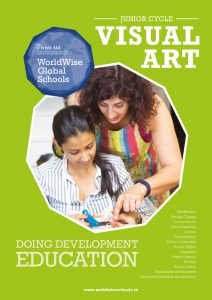Resource Title
Doing Development Education: Junior Cycle Visual Art
Summary
This resource aims to support Visual Art teachers to teach through a global justice lens, a lens with great educational benefits, which meets the requirements as laid out in the junior cycle Visual Art specification, and in the (2015) Framework for Junior Cycle. It is one of a series of WorldWise Global Schools resources that support teachers in different subject areas to address Development Education-related themes and concepts.
Resource Details
Description
Available from:
Download Doing Development Education: Junior Cycle Visual Art PDF (1.7MB) | as Gaeilge
For more, visit WorldWise Global Schools

